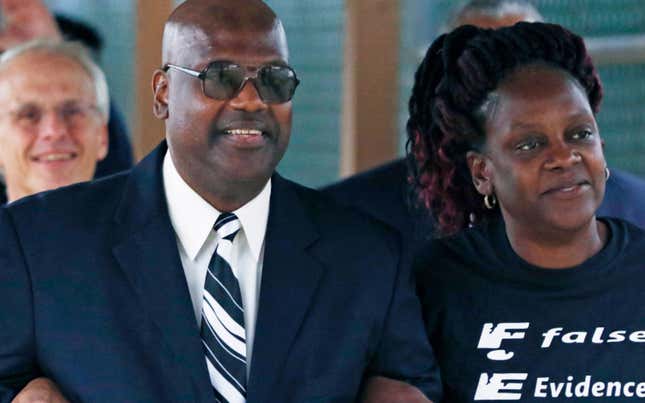
The last two decades and some change have been an arduous journey for Curtis Flowers, a Mississippi man who spent over 22 years in prison for a crime he was wrongfully convicted of. In 2019, the Supreme Court finally granted Flowers his freedom, and two years later, a judge has ordered the state to finally run Flowers his money for his wrongful conviction.
According to AP News, Montgomery County Circuit Judge George Mitchell ordered the state of Mississippi to pay Curtis Flowers $500,000 on Tuesday. That’s the maximum amount allowed under a 2009 state law that says the state can pay $50,000 for each year someone was wrongfully convicted for up to 10 years. The judge also ordered that the state separately pay Flowers’s attorneys another $50,000.
The existence of that state law implies to me that Mississippi knows their legal system comes through with the fuck shit and they were trying to preemptively avoid the financial consequences. They ain’t slick.
This tragic journey began in 1996 when Bertha Tardy, Carmen Rigby, Robert Golden, and 16-year-old Derrick “Bobo” Stewart were shot and killed in a furniture store owned by Tardy. Flowers was tried six times for the crime and had been in custody since 1997. Four of those trials ended with Flowers being convicted for both the individual deaths and all four slayings, with the other two trials ending in mistrial. Throughout all six trials, Flowers maintained that he was innocent.
From AP:
In June 2019, the U.S. Supreme Court tossed out the conviction and death sentence from Flowers’s sixth trial, which took place in 2010. Justices said prosecutors’ pattern of excluding Black jurors from his trials was unconstitutional.
The Supreme Court ruling came after American Public Media’s “In the Dark” investigated the case. The podcast recorded jailhouse informant Odell Hallmon in 2017 and 2018 recanting his testimony that Flowers had confessed to him.
The first six trials were prosecuted by the local district attorney. Flowers was still facing the 1997 indictments in December 2019 when a judge agreed to release him on bond. The district attorney handed the case to the attorney general, and her staff spent months reviewing it before deciding not to go forward because of a lack of credible witnesses.
As a result of the Supreme Court ruling, all four convictions were overturned. Flowers initially filed his suit against the state in November, seeking compensation for his wrongful conviction and court documents show that the state attorney general complied with his request.
Flowers was among those the NFL honored in December when players took to wearing decals on their helmets that put a spotlight on “victims of systemic racism, victims of police misconduct and social justice heroes.”

